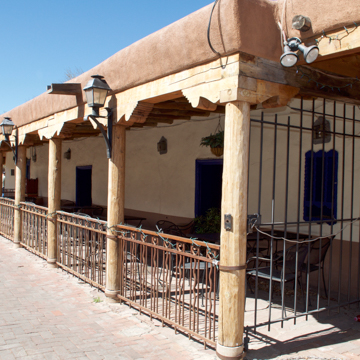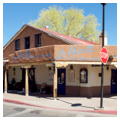You are here
La Placita Dining Rooms
The Ambrosio Armijo House and Store reflects both the Americanization of Old Town after the arrival of the railroad in 1878–1880 and its transformation into a tourist destination in the twentieth century. Built in 1880–1882 on the plaza’s east side as a combined residence and business by the prominent Old Town businessman, Ambrosio Armijo, the adobe structure, with door and window frames of milled lumber and a gable roof, was originally fronted by an Italianate portico of semicircular arches supported on slender wooden columns; the second story was probably added in 1882. After the Armijos moved their business to New Town in the early twentieth century, the building purportedly became a saloon, gambling house, and brothel before being renovated in 1935 as a restaurant, La Placita Dining Rooms, which it still houses. The Italianate portico was replaced around the same time by one in the Spanish Colonial Style, with rough-hewn posts, beams, and corbel brackets.
References
DeWitt, Susan. Historic Albuquerque Today: An Overview Survey of Historic Buildings and Districts. 2nd edition. Albuquerque, NM: Historic Landmarks Survey of Albuquerque, 1978.
DeWitt, Susan, “Old Albuquerque Historic District,” Bernalillo County, New Mexico. National Register of Historic Places Inventory–Nomination Form, 1980. National Park Service, U.S. Department of the Interior, Washington, D.C.
Johnson, Byron A. Old Town, Albuquerque, New Mexico: A Guide to Its History and Architecture. Albuquerque, NM: City of Albuquerque, 1980.
Writing Credits
If SAH Archipedia has been useful to you, please consider supporting it.
SAH Archipedia tells the story of the United States through its buildings, landscapes, and cities. This freely available resource empowers the public with authoritative knowledge that deepens their understanding and appreciation of the built environment. But the Society of Architectural Historians, which created SAH Archipedia with University of Virginia Press, needs your support to maintain the high-caliber research, writing, photography, cartography, editing, design, and programming that make SAH Archipedia a trusted online resource available to all who value the history of place, heritage tourism, and learning.



















